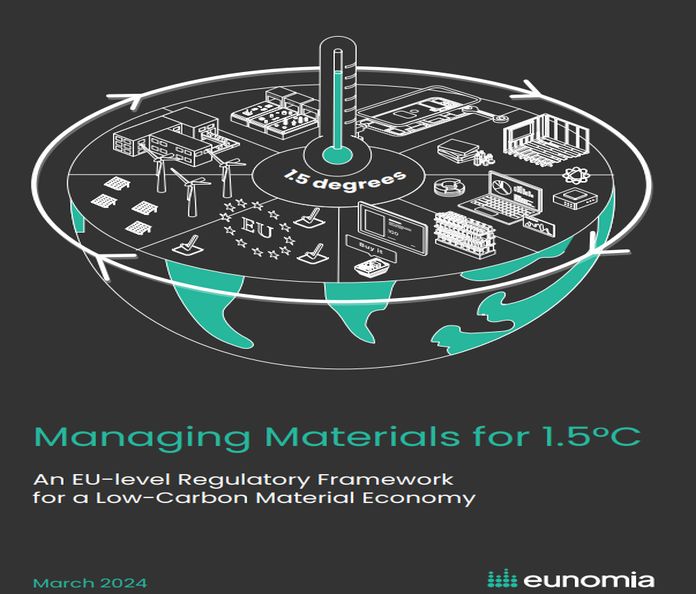BRUSSELS, Belgium – Eunomia Research and Consulting Ltd. has today published a report ‘Managing Materials for 1.5oC: An EU Regulatory Framework for a Low Carbon Material Economy’. It presents a series of recommendations designed to enable Europe to prosper whilst reducing the pressure we place on the planet from our consumption of materials.
The report was funded by a consortium comprised of Handelens Miljøfond, Minderoo Foundation, TOMRA and Zero Waste Europe all of whom have an active interest in questions relating to the way we can better manage materials in order to tackle environmental challenges.1
While decarbonisation of energy supply is crucial in tackling the climate crisis, the public and political discourse has to date largely ignored our consumption of materials. This must change. Extraction and processing of material resources account for over 55 percent of greenhouse gas emissions – more than 60 per cent if land use impacts are considered.
More broadly the extraction, manufacture, transport, use, and disposal of materials is responsible for 90% of land-based biodiversity loss and water stress.3 The extent and nature of our consumption of materials is at the heart of the triple planetary crisis – the crisis of climate change, the crisis of nature and biodiversity loss, and the crisis of pollution and waste.
The proposed regulatory framework is based on a number of underpinning principles, full details are contained within the report:
- Leveraging the power of the Single
- Minimising administrative burden for business through
- Engaging the digital
- Levelling the playing field.
- Maximising use of economic
- Securing popular support for the broad framework of measures.
- Expanding the EU’s influence on global policy for managing materials and reducing greenhouse gas
The proposed regulatory framework builds on what is already in place or underway, makes connections between policy mechanisms where relevant, and presents a number of more innovative, novel approaches in various areas. A key theme is providing greater clarity and simplification for business through harmonisation across the EU, accompanied by a transfer of decision-making competences in certain areas away from individual Member States to the EU-level.
The proposed regulatory framework encompasses:
- Decarbonising materials production
- Product policy for a low carbon economy
- Maintaining material value at end of life
- Reducing overall material consumption
The most politically challenging – but arguably also the most important – of the proposed measures is the greater application of environmental taxation at the EU-level. To overcome these challenges this important shift will have to be undertaken creatively in ways that will need to directly benefit – and be seen to benefit – the majority of citizens. That is to say that the shift overall must have broad popular appeal.
Dr Chris Sherrington, Eunomia, head of environmental policy and economics, said:
‘We recognise the political challenge of introducing the proposed measures – particularly the greater application of environmental taxation at the EU-level. Accordingly, we argue that addressing the current levels of societal inequality is both an important end in itself, but also something that might reasonably be expected to ease the political challenge of introducing the policy measures needed to move towards a low carbon material economy.’
He goes on to add: ‘While not a panacea we suggest consideration be given to the direct redistribution to EU citizens of revenues from environmental taxation and other market- based instruments such as the EU-ETS and CBAM.’
Axel Darut, Minderoo Foundation, public affairs associate, said:
‘This report offers a systemic approach, with comprehensive toolkits and a range of measures – from ecodesign to end-of-life – to accelerate a sustainable and just transition to a circular economy. We hope it inspires policymakers and global leaders to shape circular economy policies that align with the Paris Agreement.’
Bilyana Ignatova, TOMRA, vice president public affairs, head of EU policy, said:
‘To transition to a world where waste is seen as a valuable resource, a revolution is necessary – a resource revolution. It’s time for the EU, a global leader in environmental policy, to align its framework legislation with this vision.’
Cecilie Lind, Handelens Miljøfond CEO, said:
“Supporting the ‘Managing Materials for 1.5 degrees’ report aligns with Handelens Miljøfond’s mission to spearhead a shift towards a circular plastic economy. We’re investing in research that goes beyond highlighting problems, focusing instead on uncovering solutions that promote the reduction of plastic, reuse and recycling. This initiative reflects our belief in taking informed, practical steps to transform how plastic is managed, paving the way for sustainable industry practices.”
Aline Maigret, Zero Waste Europe, head of policy, said:
“Amidst the urgency to stay within a 1.5 degrees carbon budget, this new report underscores a pivotal shift in perspective: from a waste-focused policymaking we need to put strategic resource use at the heart of EU’s priorities. It suggests reimagining materials, offering pragmatic solutions that engage progressive businesses, and adapt to changing politics.”







